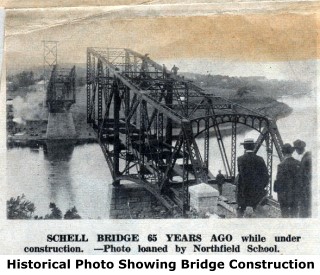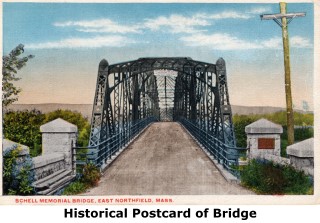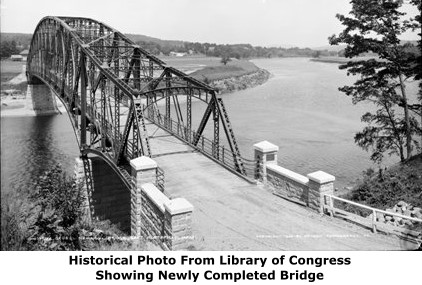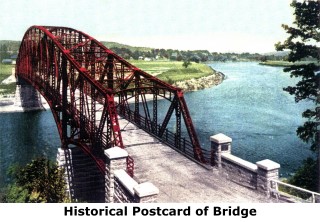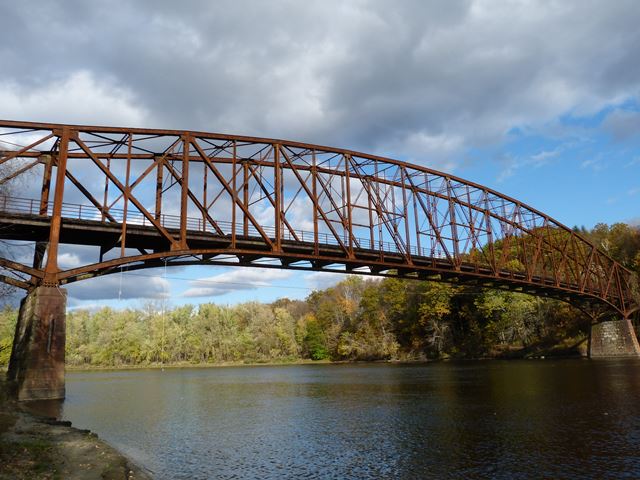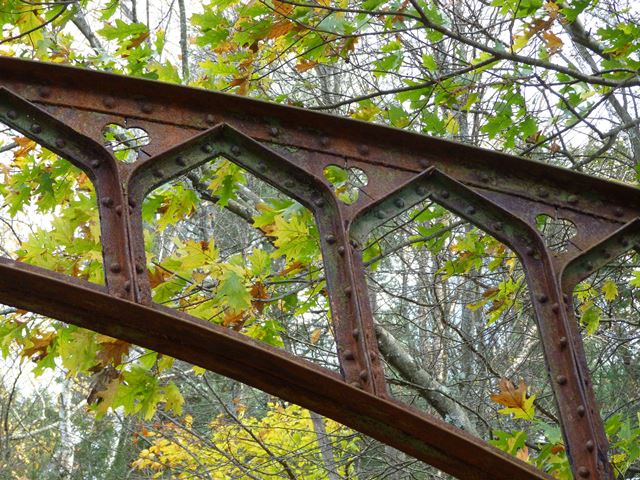We Recommend:
Bach Steel - Experts at historic truss bridge restoration.
BridgeHunter.com Phase 1 is released to the public! - Visit Now
Schell Bridge
Northfield Bridge
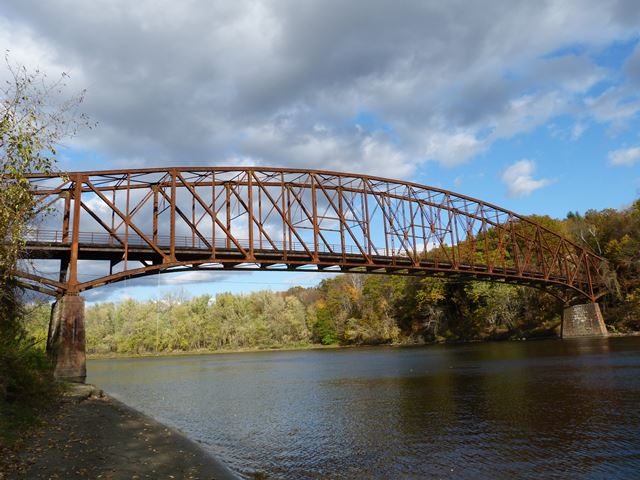
Primary Photographer(s): Nathan Holth
Bridge Documented: October 18, 2013
Northfield: Franklin County, Massachusetts: United States
1903 By Builder/Contractor: New England Structural Company of East Everett, Massachusetts and Engineer/Design: Edward S. Shaw of Boston, Massachusetts
Not Available or Not Applicable
352.0 Feet (107.3 Meters)
515.0 Feet (157 Meters)
17.4 Feet (5.3 Meters)
3 Main Span(s)
MUN236002100

View Information About HSR Ratings
Bridge Documentation
This bridge's future is at risk!
Bridge Status: This bridge is slated for demolition and replacement... a project now supported by a group once dedicated to preserving this bridge!Some excellent news for this bridge, the grant to demolish and replace one of the most unique bridges in the country has NOT been awarded! https://www.gazettenet.com/SchellBridgeNoGrant011623-49557539
The group should take advantage of this opportunity to return to the original purpose of their group which was the restoration of the existing historic bridge.
Note from the author: I do not normally put explicit materials on this website but this Friends group took money I donated to support "restoration" and they used it to promote "demolition." For that reason this bridge's song is: https://www.youtube.com/watch?v=sS8lZSPIW9Y (Explicit Lyrics)
View Archived National Bridge Inventory Report - Has Additional Details and Evaluation
View Historic American Engineering Record (HAER) Documentation For This Bridge
HAER Data Pages, PDF
View Original Plans For This Historic Bridge
View A Historical Article About This Historic Bridge
View Massachusetts Historical Commission (MHC) Inventory Forms For This Historic Bridge
About This Bridge
Be sure to review the HAER data pages for this bridge. They have an extensive history of the structure and its builders, and also include a number images of the bridge and the bridge builder advertisements, etc. A detailed historical article is also available.
This bridge utilizes an unusual cantilever design that is certainly among the minority of bridge designs. The bridge is continuous over the piers, but the ends of the bridge from the piers to the abutments function as cantilevers. In this unusual design, no dead load is applied to the abutments, however bearings at the abutments were designed to dynamically adapt to and absorb live load forces turning the bridge into a continuous bridge when under traffic. Giant springs at the bearings can be easily seen as evidence of this unusual design.
Although this bridge is structurally different from typical cantilever truss bridges, the visual aesthetic of this bridge is an early prototypical example of an arched design used to eliminate unsightly overhead tower-like visuals on cantilever truss bridges. This application of maintaining a graceful curved shape on the top chord, and moving the "tower" portion to the bottom chord sections of the truss can be seen in this bridge and compared to later cantilever truss bridges that utilized a similar aesthetic, such as Michigan's Blue Water Bridge. There are some other bridges out there that also utilize this design, but not many, and virtually none are as old as the Blue Water Bridge, let alone the 1903 Schell Bridge. The HAER data pages for this bridge note that the design of this bridge was similar to another bridge, Bennett's Meadow Bridge, which did not have the cantilevers.
Visually, this is a striking bridge. Cantilever style bridges usually appear over larger bodies of water. This is a pleasing change from the usual to find such a bridge on a river the size of the Connecticut River in this area. Perhaps the most noteworthy visual asset is the stunning gothic portal bracing design, which is unlike any designs found on other truss bridges. The beauty of the bridge is also enhanced by extensive lattice and v-lacing on the various members, chords, and bracing on the bridge. Tall stone piers and abutments complete the image, creating a scene of beauty that should be a crime to destroy.
A high resolution historical photo of the bridge reveals the text of a plaque that was mounted at the end of the bridge. This plaque read "This bridge is erected in memory of Robert and Mary Schell of New York by their son Francis Robert Schell."
About The Friends of Schell Bridge
When HistoricBridges.org first learned of this bridge years ago, they got in touch with a group called the Friends of the Schell Bridge. The bridge had been threatened with demolition, this group was reportedly trying to stop that. The following is what their group's purpose was described as:
Friends of Schell Bridge Vision: A beautifully-restored historic bridge across the Connecticut River that serves both as a premier recreational link for a network of hiking and biking trails in the tri-state region and as a
centerpiece for a series of linked parks for Northfield and area residents.
Friends of Schell Bridge Mission: To ensure the rehabilitation of Schell Memorial Bridge through adequate funding, proper maintenance, public support, and
active promotion of its place in Northfield's history and to encourage citizen enjoyment of the footpaths, bikeways, and parks that connect to the bridge. These goals will be realized through partnerships with local, state and federal
government, local and regional organizations and through the development of a conservancy organization dedicated to the stewardship of the bridge and parks.
HistoricBridges.org interpreted this to mean that the group would seek the preservation of this bridge until all possibilities had been investigated, campaigned for, and exhausted before giving up. Under this assumption, for several years, HistoricBridges.org made a small donation to the group annually as a sign of support for the group's effort.
In 2013, MassDOT suddenly stated that to rehabilitate the bridge would cost $20 Million, but for a mere $5 million they would demolish the bridge and build a new bridge that would supposedly look like the historic bridge. Where did the $20 Million estimate for rehabilitation come from? They probably got that estimate from an engineer that lacks experience in restoration of historic bridges. An engineer with a deep, varied portfolio of successful restorations of historic bridges should have been sought. J. A. Barker Consulting Engineer in Indiana is a great example. He was able to rehab a truss bridge for 20% the cost of replacement. That might not be possible with the Schell Bridge, but it is hard to believe that the rehab would cost so much. MassDOT apparently gave the impression that a replacement bridge at the cost they estimated would look even remotely like the beautiful existing bridge, which is deceptive. Modern bridges are plain looking, ugly, and generally made of a pre-fabricated design. Moreover, it is unclear how MassDOT thinks that for only $5 million one of these bridges can be installed given the considerable span between piers. These types of prefabricated bridges are not usually used for spans this long. It may in fact cost more than $5 million to put any type of replacement bridge up at this location. Additionally, because of this very long pier to pier span length, this will likely limit the options of a type of replacement bridge at the cost MassDOT has estimated, further forcing them into a non-descript modern bridge perhaps of low quality. Any replacement bridge would almost certainly lack the built-up beams, rivets, and architectural details that make the Schell Bridge visually stunning. Finally, MassDOT has apparently claimed that a rehabilitated Schell Bridge would have enormous maintenance costs, while a replacement bridge would have little maintenance costs. First, as long as winter deicing salts are kept away from the metal trusses, restored pedestrian truss bridges do not cost much to maintain. Any type of deck, including low maintenance materials resistant to salt, could be put on the Schell Bridge. Second, the concept that a replacement bridge does not require maintenance is downright false. However many agencies try to claim this. Pennsylvania is notorious for this, and apparently MassDOT is joining in on the act.
Despite all these obvious concerns about the MassDOT proposal and where the cost estimates came from, the Friends of Schell Bridge reacted to the $5 Million replacement project immediately and threw their mission and vision to the wind and declared support of the proposal to demolish and replace the bridge. Suddenly, all that the group cared about was having a functional crossing for a non-motorized trail. Although this was always part of the goal, why did they suddenly abandon the other half of their purpose, before even questioning the MassDOT proposal... a proposal from an agency that has long wanted rid of historic bridge, seeking its demolition. HistoricBridges.org has contacted the group several times requesting that they use some of the money that has been donated to them over the years to hire an engineer with proven experience in truss bridge restoration to evaluate the bridge. HistoricBridges.org has also asked them to remain true to their vision and mission (which guides HistoricBridges.org's decision to donate to their group) until more investigation is complete and every possibility for rehabilitation has been exhausted... like the possibility of using the money MassDOT is offering toward a rehabilitation project rather than a replacement project. So far, there has been little interest from the group in doing this however. This premature abandonment of the vision and mission of the group feels like a betrayal to those who donated to the group based on their stated mission and vision. No matter how small the donation, the fact remains that the group is now using funds donated from HistoricBridges.org to promote the demolition of a historic bridge before all options for preservation have been investigated. This represents a direct conflict of interest with HistoricBridges.org's calling to promote the preservation of our transportation heritage. Sadly, the negative experience here means that it is unlikely that HistoricBridges.org will donate to any other preservation groups in the future. Most of HistoricBridges.org's money is spent on photo-documentation, so little money exists in the first place, certainly not enough to waste on groups who are not willing to carry the fight for preservation through to the end.
Visit the "Friends" of Schell Bridge Website to learn more about previous efforts to save this bridge. Note: This group has recently stated that they no longer wish to see this bridge preserved. Instead, this group has joined forces with MassDOT and is seeking the demolition and replacement of this historic bridge! This website has not been updated to reflect this.
![]()
Photo Galleries and Videos: Schell Bridge
Structure Overview
Original / Full Size PhotosA collection of overview photos that show the bridge as a whole and general areas of the bridge. This gallery offers photos in the highest available resolution and file size in a touch-friendly popup viewer.
Alternatively, Browse Without Using Viewer
![]()
Structure Details
Original / Full Size PhotosA collection of detail photos that document the parts, construction, and condition of the bridge. This gallery offers photos in the highest available resolution and file size in a touch-friendly popup viewer.
Alternatively, Browse Without Using Viewer
![]()
Structure Overview
Mobile Optimized PhotosA collection of overview photos that show the bridge as a whole and general areas of the bridge. This gallery features data-friendly, fast-loading photos in a touch-friendly popup viewer.
Alternatively, Browse Without Using Viewer
![]()
Structure Details
Mobile Optimized PhotosA collection of detail photos that document the parts, construction, and condition of the bridge. This gallery features data-friendly, fast-loading photos in a touch-friendly popup viewer.
Alternatively, Browse Without Using Viewer
![]()
Maps and Links: Schell Bridge
Coordinates (Latitude, Longitude):
Search For Additional Bridge Listings:
Bridgehunter.com: View listed bridges within 0.5 miles (0.8 kilometers) of this bridge.
Bridgehunter.com: View listed bridges within 10 miles (16 kilometers) of this bridge.
Additional Maps:
Google Streetview (If Available)
GeoHack (Additional Links and Coordinates)
Apple Maps (Via DuckDuckGo Search)
Apple Maps (Apple devices only)
Android: Open Location In Your Map or GPS App
Flickr Gallery (Find Nearby Photos)
Wikimedia Commons (Find Nearby Photos)
Directions Via Sygic For Android
Directions Via Sygic For iOS and Android Dolphin Browser
USGS National Map (United States Only)
Historical USGS Topo Maps (United States Only)
Historic Aerials (United States Only)
CalTopo Maps (United States Only)


